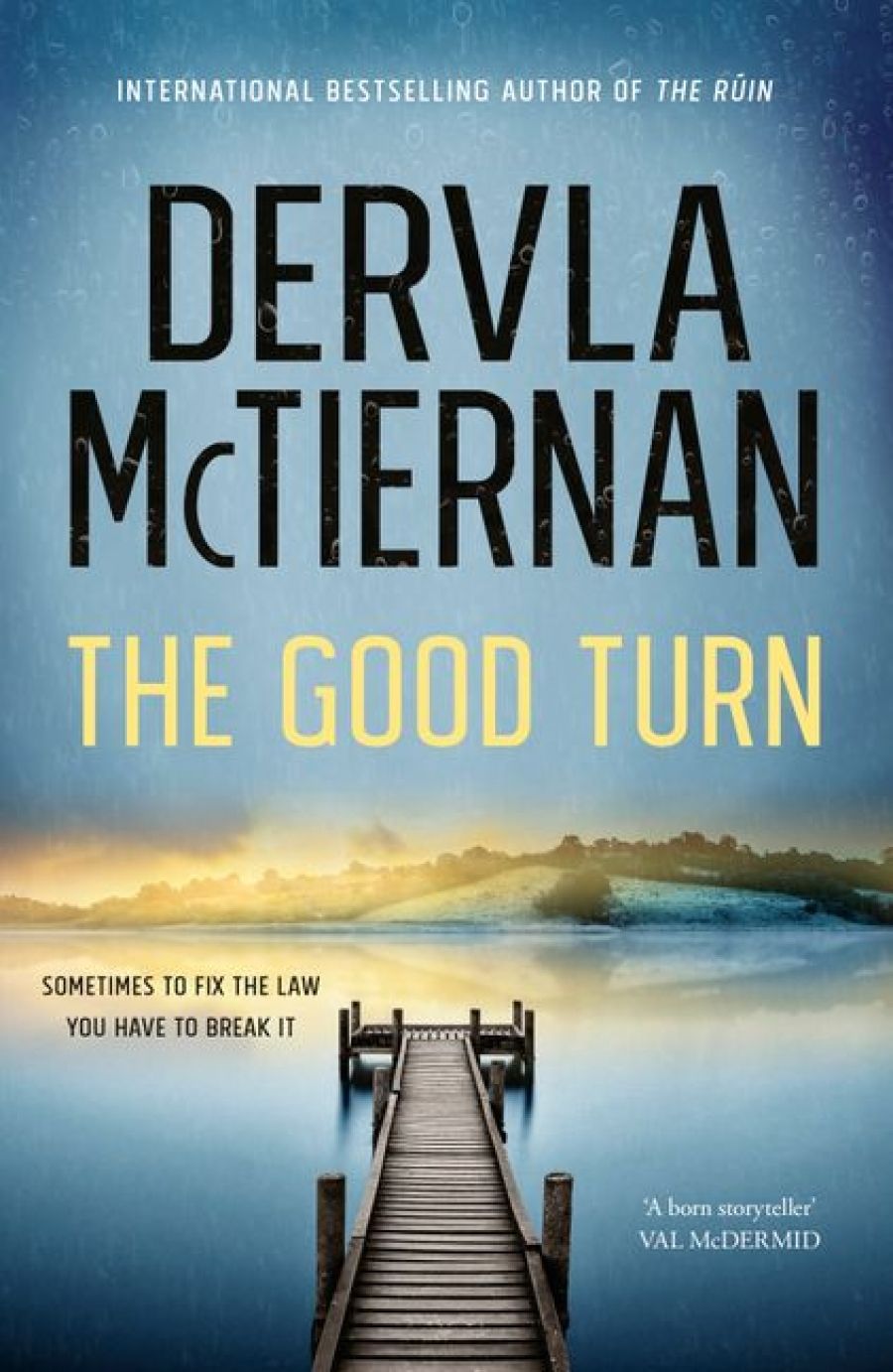
- Free Article: No
- Contents Category: Fiction
- Review Article: Yes
- Online Only: No
- Custom Highlight Text:
Dervla McTiernan’s third novel consolidates her standing as a star of Irish detective fiction, following her breakout début, The Rúin (2018), and its follow-up, The Scholar (2019), all featuring Detective Sergeant Cormac Reilly. Dublin dominates the imagination of Irish crime writing, but McTiernan’s stories centre around the western city of Galway and the small towns that surround it, places with pretty, smiling exteriors that mask darker moral and economic realities. For every cheerful local pub and beautiful seaside terrace there is a building lot abandoned in the wake of economic crisis and a cheaply constructed block of units with no heating and a rent-gouging landlord.
- Grid Image (300px * 250px):

- Book 1 Title: The Good Turn
- Book 1 Biblio: HarperCollins, $32.99 pb, 400 pp
The opening of The Good Turn seems to promise a familiar script when Sergeant Peter Fisher’s first weekend off in a long time is interrupted by a call to investigate a report of a child abduction. Fisher is the only one on duty at the understaffed station. He’s hungover, slow, and reluctant: no one takes the report seriously, because it was made by a boy who said he saw Slender Man, a fictional internet villain, kidnap a girl. When Fisher shows up, the situation turns out to be different: there really has been a violent abduction, and the police have wasted precious time that could have terrible consequences. You have seen this episode of gritty police drama, or something like it; you steel yourself for a grisly outcome and a protracted search for the culprit replete with twists and multiple murders. But what happens next, as they say, will surprise you.
Her police – ‘Gardai’, as they are called here – are complicated people. Reilly is a good guy who tries to do things by the book, but he seems prone to making bad decisions, and he is now isolated and unmoored. His girlfriend has decamped to Brussels, reasonably upset about being regarded as a prime suspect in Reilly’s most recent murder case; he left his good job in Dublin to be with her in Galway years earlier, and now he doesn’t know where he belongs except in the police force that seems determined to push him out. Many of his colleagues don’t trust him, and the few that do are tired of his relentless air of superiority. ‘You think you’re better than everyone else’ is a line uttered by one of his enemies and also by Fisher, Reilly’s protégé, infuriated by the realisation that his victimisation by superiors is a direct retaliation for his closeness to Reilly. ‘Nobody likes that and you can’t blame them for it,’ Fisher says. ‘Stop pissing people off,’ Reilly is told bluntly by another colleague, but that turns out to be impossible. Reilly’s task in the novel is not only to clear his own name but also to save Fisher’s reputation, and his unconcern for pissing people off is a necessary strength.Soon the abduction narrative becomes something else altogether, central to a gradually unfolding story of police corruption. McTiernan’s writing has the polish and pace of top-shelf crime fiction, but her work is made exceptional by the way she veers from the scripts that define the genre, along with her thoughtful attention to quotidian details of character and place. She is equally interested in the stories told by everyday failures and inadequacies of the justice system and in the people who administer it as she is in the dramatic successes or cover-ups. Her police are not divided strictly into good cops and bad cops. The heroes have their faults and there are grey areas: the cops who are demoralised, inexperienced, lazy, exhausted, or who take justice into their own violent hands in despair at the limits of the system.
Fisher emerges as an equally compelling character whose story here has equal weight. In disgrace, he is exiled to his home town of Roundstone and forced to work under his estranged father. Des, the town’s only full-time police officer, an alcoholic and womaniser whose agenda is unclear. Even though his emulation of Reilly has cost him so much, Fisher here applies the assiduous, principled attention to detail he has learned from the older detective and uncovers dark secrets beneath the town’s picturesque surface.
The two narratives are bound together by the story of Anna, a young woman with her daughter: on the run from some mysterious threat, they find refuge with Fisher’s grandmother Maggie in Roundstone. Anna and Maggie’s friendship, a quiet illustration of female support and solidarity, provides a welcome counterpoint in this world where so many people in positions of power are able to abuse it with seeming impunity.
Slick crime dramas often show police investigations of vast scale with access to an astounding range of technology, from rapid DNA testing to detailed CCTV footage of seemingly every street corner. McTiernan’s police, on the other hand, struggle with systemic incompetence, a crippling lack of resources, and huge-scale corruption that makes it virtually impossible to do their jobs. Reilly’s boss tells him sneeringly to ‘innovate’ and ‘adapt’ to the ‘constrained environment of modern policing’. How, McTiernan asks, does a good cop manage to be a good cop in this world, this environment constrained by pinched resources, the constant shadow of corruption, the drag of indifference, the limits of the system even when it works as it is intended? Events force both Fisher and Reilly to interrogate what it means to be police, to question their calling, to find out what forms of moral compromise they are able to handle, and to learn how they are defined by their answers to those questions.


Comments powered by CComment